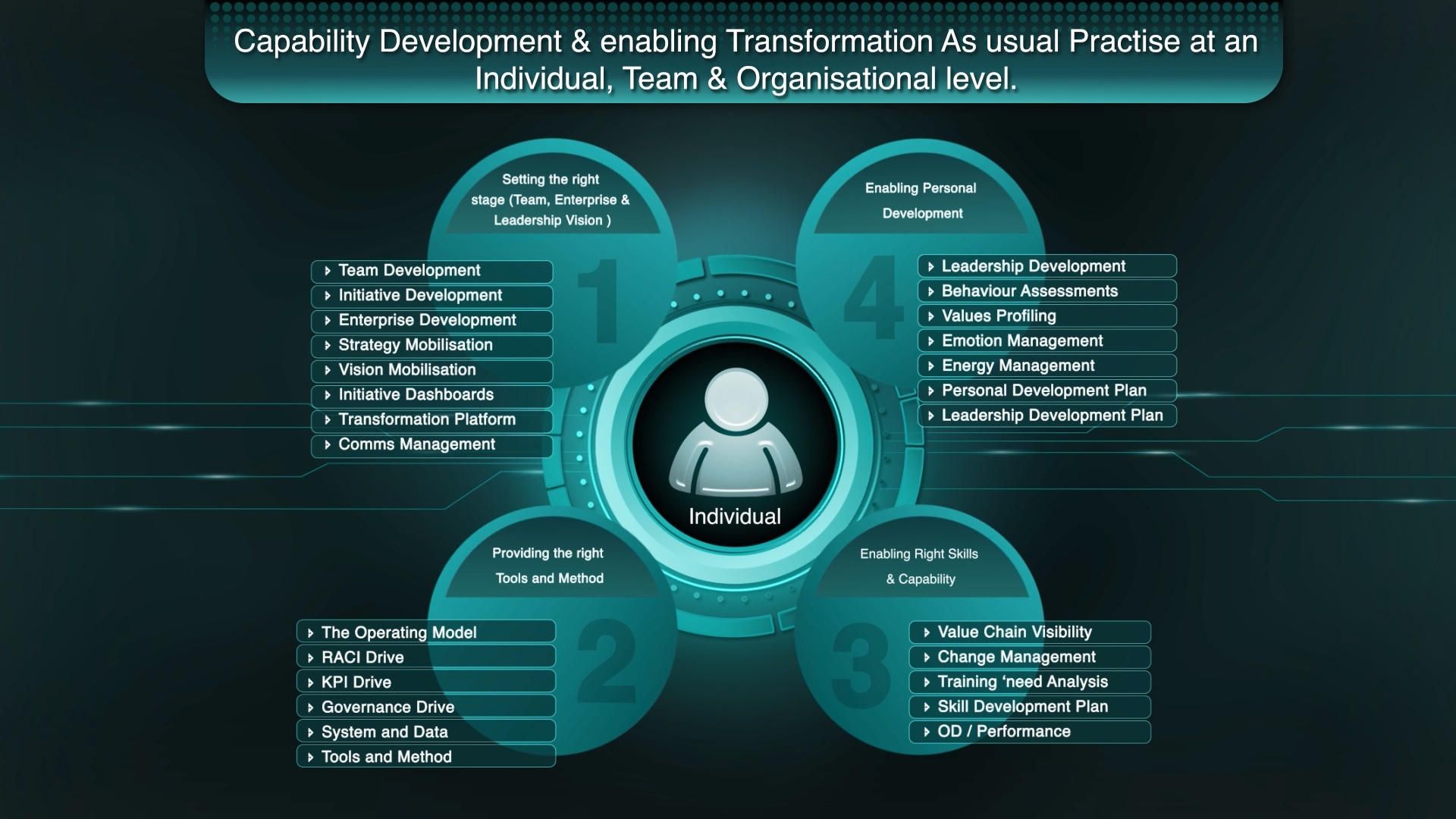Financial Services – Enterprise Business Transformation
An Introduction To Our Financial Services Platform
Modus Business Transformation Core Modules
Building, Driving and Sustaining your Business Transformation and embedding a 'Transformation As Usual' platform.
01 - Business Model Management - Manage and Adapt
Embrace the Business Model Management Hub to navigate and thrive in the ever-evolving business landscape with confidence and clarity.
Manage and Adapt
Our Business Model Management Hub is a comprehensive solution designed to help you set up and analyze your current and future business models, covering critical aspects like markets, customers, products, and services. It is crucial for maintaining a competitive edge in today’s dynamic business environment.
Key Features and Benefits:
• Business Model Management: Define and refine your business models to
align with market demands and organizational goals.
• Business Transformation Survey: Gain insights into your transformation
readiness and identify areas for improvement.
• Transformation Strategy Hub: Develop and execute a robust transformation
strategy to ensure seamless adaptation to market changes.
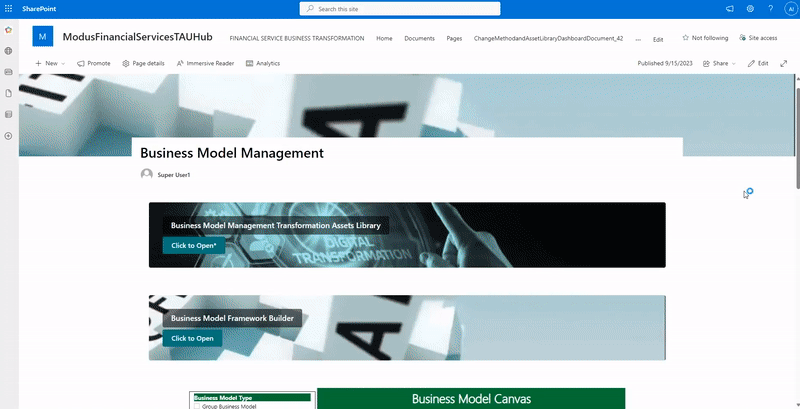
Importance:
• Strategic Alignment: Ensures your business models are in sync with your
strategic objectives, enhancing overall business coherence.
• Market Responsiveness: Enables quick adaptation to market trends and
customer needs, keeping your business agile and competitive.
• Comprehensive Analysis: Provides tools for in-depth analysis of various
business aspects, helping identify opportunities for growth and improvement.
• Informed Decision-Making: Facilitates data-driven decisions with detailed
insights into business performance and transformation progress.
• Enhanced Efficiency: Streamlines the process of managing and adapting
business models, saving time and resources.
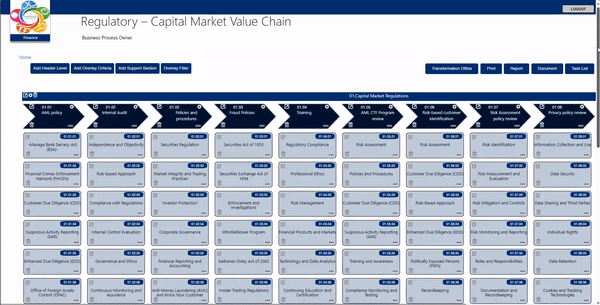
Importance:
• Holistic Understanding: Provides a complete picture of your business
operations, ensuring no aspect is overlooked.
• Strategic Planning: Helps you plan and execute growth strategies based on
detailed value chain insights.
• Operational Efficiency: Identifies inefficiencies and bottlenecks, enabling you
to streamline operations and reduce costs.
• Informed Decision-Making: Facilitates data-driven decisions by offering
clear, actionable insights into your value chain.
• Sustainable Growth: Supports long-term business growth by aligning
operational activities with strategic objectives.
02 - The Value Chain Modeler - Manage and Adapt
Harness the power of the Value Chain Modeler to drive your business forward with clarity, precision, and confidence.
Manage and Adapt:
Our Value Chain Modeler is a powerful tool designed to help you understand and optimize your entire business model by mapping out every touchpoint in your end-to-end value chain. It enables you to articulate, illustrate, and plan for sustainable business growth.
Key Features and Benefits:
• Value Chain Analysis: Gain a comprehensive view of your business
processes, identifying key areas for improvement and efficiency.
• Value Chain Surveys: Collect valuable data to understand the performance
and effectiveness of each segment of your value chain.
• Target Operating Model: Develop and implement a strategic operating model
that aligns with your business goals and market demands.
03 - The Operating Model - Organize and Sustain
Utilize the Operating Model to keep your business operations organized, efficient, and adaptable, ensuring long-term success and growth.
Organize and Sustain
Our Operating Model is designed to help you define, capture, and visualize your operational processes and activities, creating a 'living' process knowledge hub known as the Ways of Working Centre of Excellence.
Key Features and Benefits:
• TOM and Operating Model Design: Develop and refine your Target
Operating Model (TOM) to align with strategic objectives.
• Operating Model Components: Integrate essential components for seamless
operational efficiency.
• Product and Services Value System Design: Optimize the value system for
your products and services to enhance delivery and performance.
• Customer Experience Design (CX): Improve customer satisfaction through
strategic CX design.
• Business Role and Skill Based Design: Define roles and develop skills to
match business needs.
• Process Support Office: Provide ongoing support and maintenance for
process management.
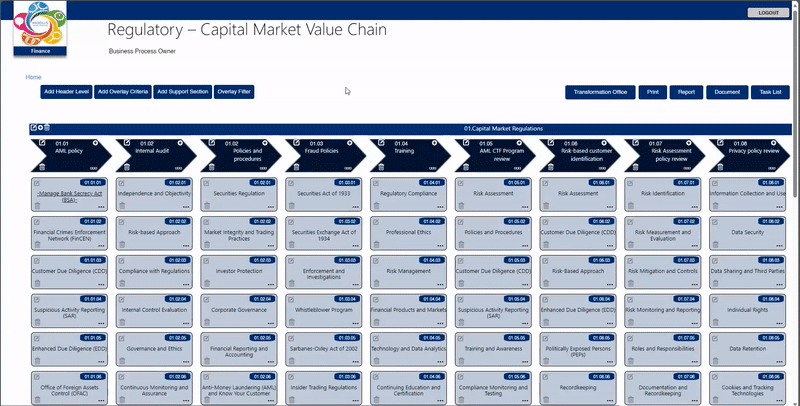
Importance:
• Comprehensive Organization: Ensures all operational processes are well-
organized and aligned with business goals.
• Sustainable Operations: Maintains a dynamic and adaptive operational
framework, keeping processes current and effective.
• Enhanced Efficiency: Streamlines operations by visualizing and managing
all components of the operating model.
• Continuous Improvement: Acts as an ongoing training guide, facilitating
continuous learning and development.
• Improved Customer Experience: Enhances customer satisfaction through
well-designed service and experience frameworks.
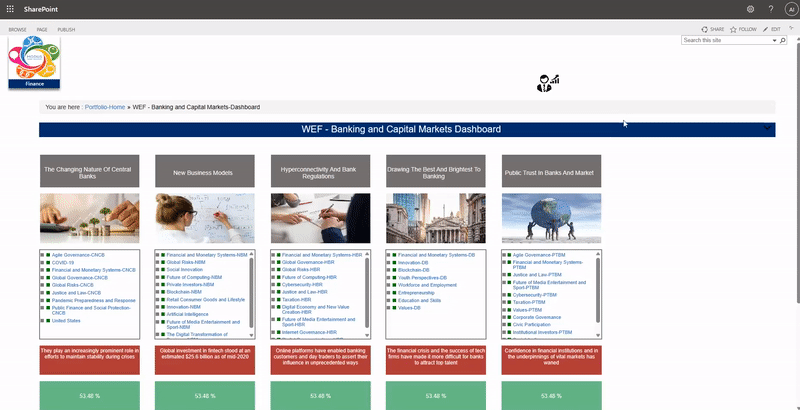
Importance:
• Comprehensive Support: Provides all the tools and resources needed for
successful transformation.
• Centralized Management: Centralizes management of all transformation
activities for better control and oversight.
• Efficient Execution: Streamlines the execution of transformation projects with
pre-defined templates and methods.
• Sustainable Transformation: Ensures that transformation efforts are
sustainable and aligned with business goals.
04 - The Transformation Assets and Portfolio Module - Discover and Transform
Leverage the Transformation Assets and Portfolio Module to drive successful and sustainable business transformations with clarity and efficiency.
Discover and Transform
Our Transformation Assets and Portfolio Module is designed to help you successfully execute and deliver your transformation vision using a comprehensive library of pre-defined templates and methods.
Key Features and Benefits:
• Portfolio Management Office: Centralize and manage all transformation
projects and initiatives.
• Pillar/Initiative Management Office: Focus on specific transformation pillars
and initiatives for targeted impact.
• Program Management Office: Oversee and coordinate multiple related
projects to achieve strategic objectives.
• Project Management Office: Manage individual projects effectively to ensure
successful delivery.
• Project Support Office (or Virtual PMO): Provide ongoing support and
resources for project management.
• Value Chain Analysis
• Business Model Analysis
• Transformation Strategy
• Transformation Mobilisation
• Planning Management
• Transformation Log Management
• Financial Management
• Communication Management
• Operating Model Management
• Process Design Management
• IT Design Management
• Build and Test Management
• Implementation Management
• Change Management
• Personal Development Assessments
• Training Management
• Organizational Design Management
• Transformation Review
• Optimization and Governance
05 - Organizational Change Management - Unite and Thrive
Utilize the Organizational Change Management module to unite your team and thrive through effective, sustainable change.
Key Features and Benefits:
• Change Management Office: Centralizes and oversees all change initiatives
to ensure alignment and effectiveness.
• Comms Management Office: Manages communication strategies to keep
everyone informed and engaged.
• Organizational Design Management Office: Develops and optimizes
organizational structures for better efficiency and adaptability.
• Leadership Development Practices: Strengthens leadership capabilities to
drive and sustain change.
• Change Workbench: Provides tools and resources for planning, executing,
and monitoring change activities.
• Adoption and Course Correct: Ensures change is fully adopted and makes
adjustments as necessary for continuous improvement.
• Training and Launch Academy: Delivers comprehensive training programs to
prepare employees for new roles and processes.
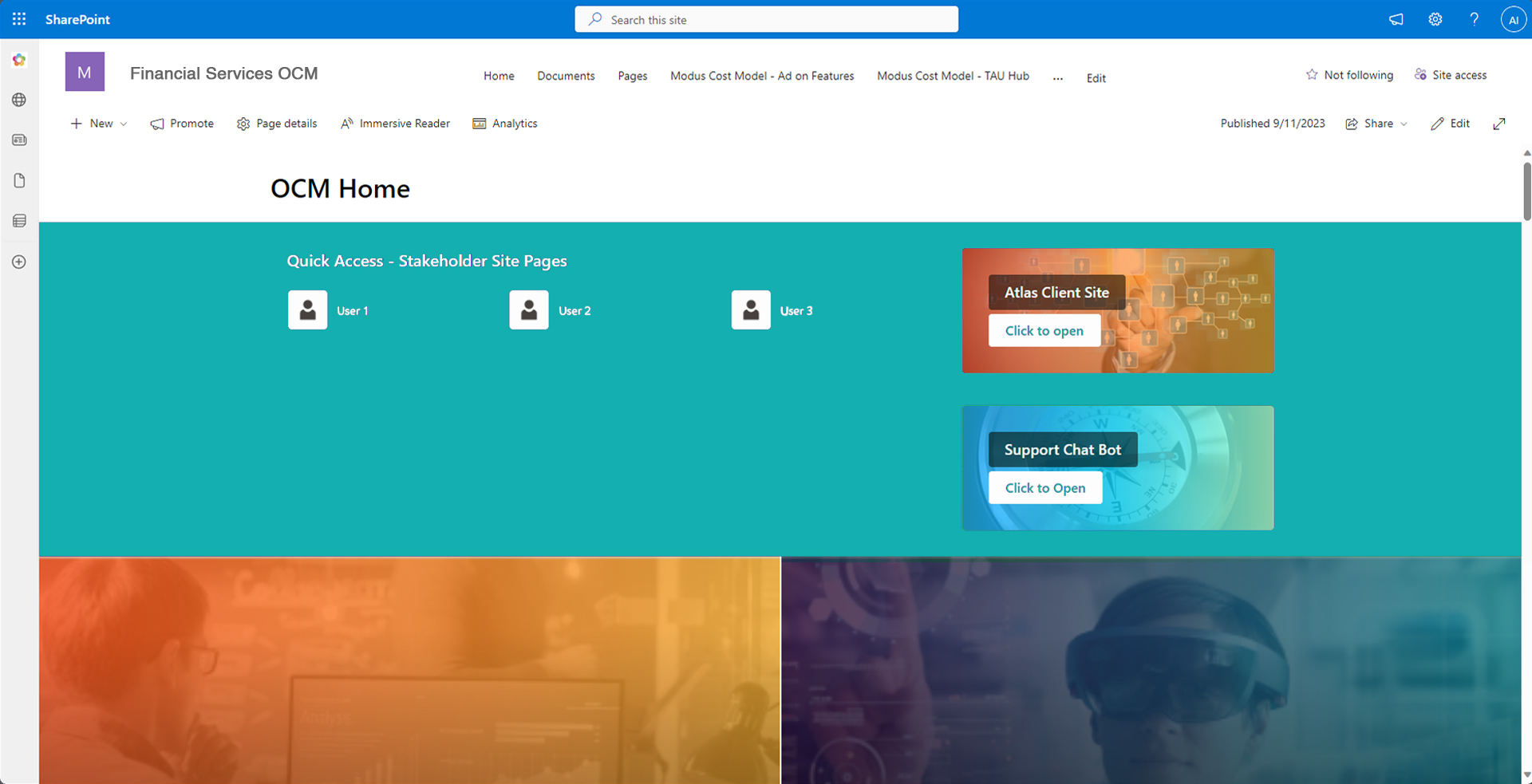
Importance:
• Effective Change Adoption: Ensures changes are fully integrated and
accepted within the organization.
• Enhanced Communication: Keeps all stakeholders informed and engaged
throughout the change process.
• Optimized Structures: Develops efficient and adaptable organizational
structures.
• Leadership Empowerment: Builds strong leadership to guide and support
change initiatives.
• Continuous Improvement: Monitors and adjusts change strategies to ensure
ongoing success.
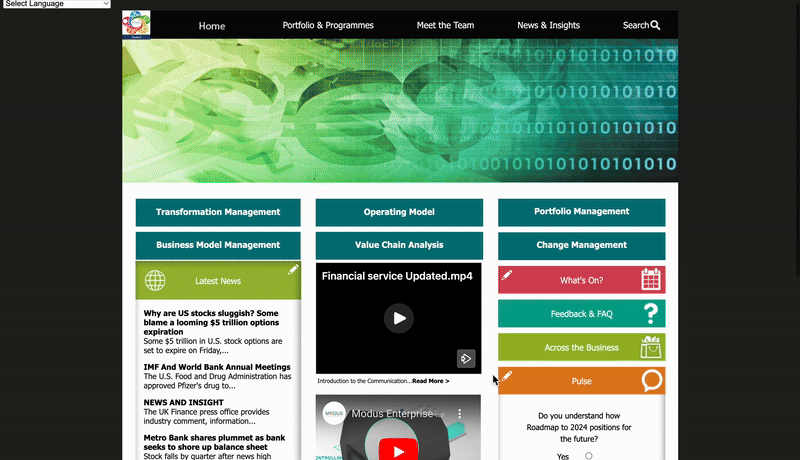
Importance:
• Unified Communication: Ensures all stakeholders have access to consistent
and up-to-date information.
• Enhanced Collaboration: Facilitates teamwork and collaboration through
dedicated areas for different teams.
• Effective Feedback: Enables continuous improvement by collecting
feedback through surveys.
• Global Reach: Supports diverse teams with language capabilities, ensuring
clear communication.
• Proactive Management: Keeps everyone on track with calendar roadmaps
and real-time alerts.
06 - Engagement Hub - Share and Guide
Utilize the Engagement Hub to streamline your communication, enhance team collaboration, and guide your organization through successful transformations.
Share and Guide
Our Engagement Hub centralises all communication and resources related to transformation, providing a unified platform for sharing information and guiding teams through the change process.
Key Features and Benefits:
• Centralize Transformation Comms: Consolidates all transformation-related
communications for easy access and management.
• Latest News: Keeps everyone updated with the most recent developments
and updates.
• Poll Surveys: Gathers feedback and insights from teams through regular
surveys.
• Transformation Team Areas: Dedicated spaces for transformation teams to
collaborate and share resources.
• Business Team Areas: Provides specific areas for business teams to access
relevant transformation information.
• Calendar Roadmaps: Visualize and manage key transformation milestones
and events.
• Language Capability: Supports multiple languages to ensure inclusivity and
understanding across global teams.
• Transformation and Change Alerting: Sends real-time alerts to keep
everyone informed about critical changes and updates.
Transformation As Usual Capability Model
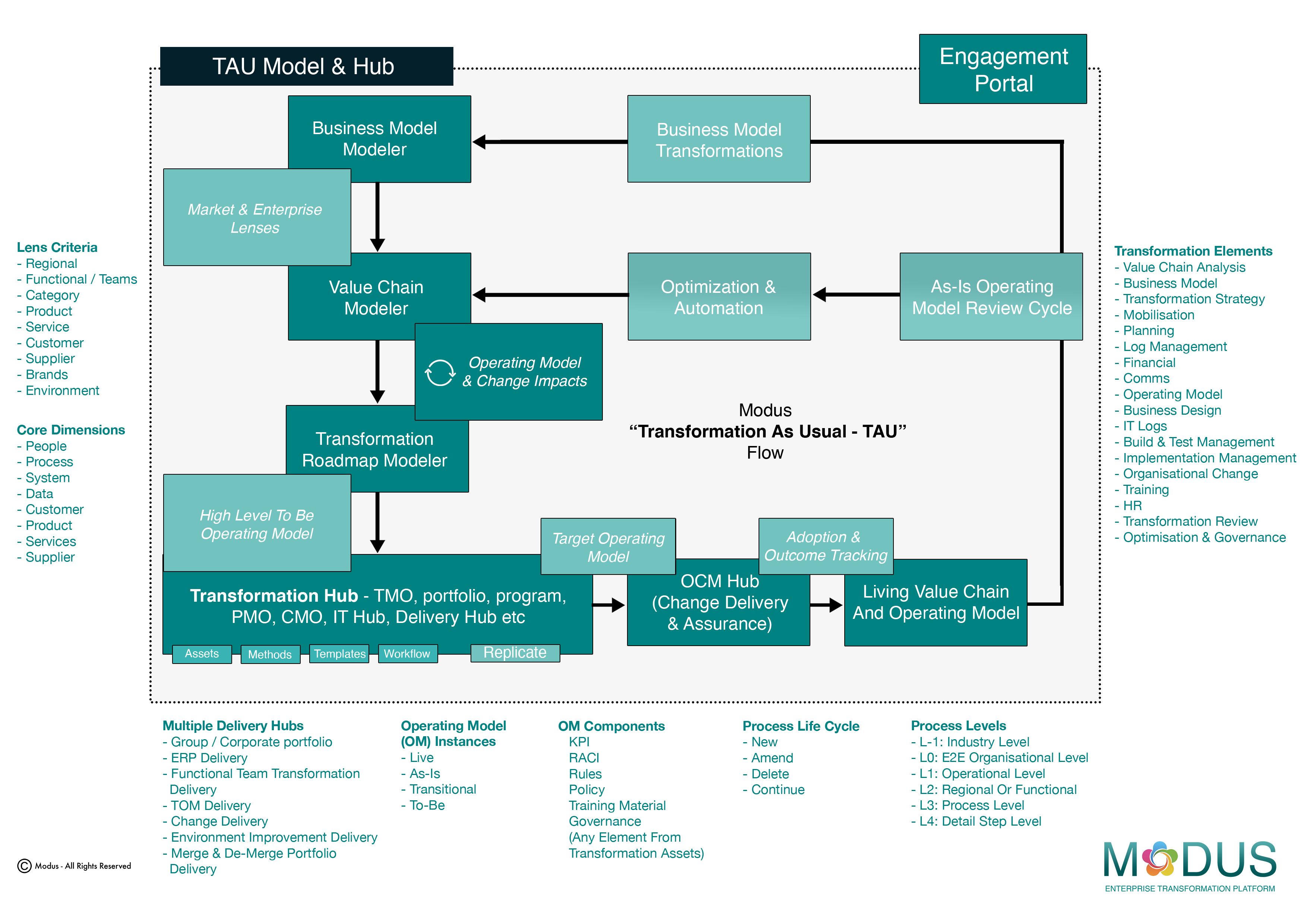
Individual and Team Capability Development
